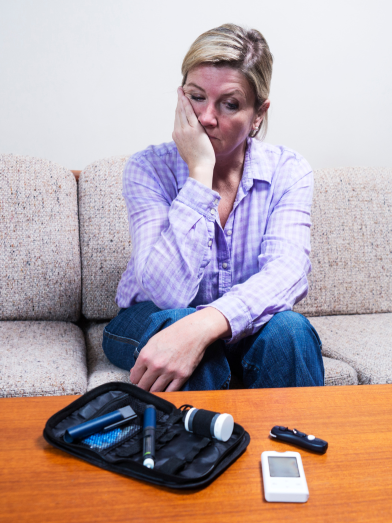
Diabetes can be tough on mental health—and for many of us, the stress of managing diabetes can take its toll. Knowing how to ease your mind and body in anxious moments can contribute to a sense of security. Follow these tips and tricks to ease stress from diabetes care.
Here are 11 strategies to help you feel safe and centered when everything becomes a bit too much.
- Challenge panicky thoughts
“I’ll never be able to control my blood glucose.” Sound familiar? Dwelling on worst-case scenarios—what therapists call catastrophic thinking—is easy to do in moments of stress, even though such thoughts rarely reflect reality. It’s essential to challenge the basis of our beliefs, especially when we are hurting. Instead, focus on what is happening now and say to yourself, “In this moment, I am safe. There is no threat to my well-being.” Breathe, let go of needless worries and relax. - Act now
When your diabetes to-do list feels overwhelming, pick something you can do right now and act on it. Get up from your office desk and walk around the block or schedule a 30-minute exercise break on your calendar twice a week. You might feel more in control if you start to make small, healthy changes to your daily routine. - Breathe
Your body tells you when you’re feeling stressed. Your breathing may become shallow and quick and your muscles tense. Deep, regular breathing helps steady your heart rate and calm your nervous system. Try to soothe yourself by counting your breaths: Inhale to a slow count of four, hold your breath for a count of seven, and exhale for eight. Practice this timed breathing first thing in the morning and again at bedtime—and make it a habit. - Have a mantra
When facing an anxiety-provoking situation, think of a meaningful phrase that can help you get through it. For example, many people with diabetes dread checking their numbers because, if their blood glucose is high, they blame themselves for doing something wrong. Instead, you should think of test results as simply the information you need to manage your diabetes well. Think, ‘It’s just a number.’ Shift from focusing on the results to your efforts to manage your diabetes because that’s all you can control. - Go to your happy place
When you feel stress building, close your eyes for a few minutes and imagine yourself in a peaceful place. Bring all of your senses to the scene. For example, if you’re imagining the seashore, note the sound of the waves, the salty smell of the air, the feeling of a cool breeze on your face and the grainy sand between your fingers. This imagery can provoke calmness and tranquility. - Move
Exercise is a great way to quickly boost your mood. Even 15 minutes of moderate aerobic exercise, such as walking or biking, can prompt your brain to release feel-good hormones. Easy moves such as leg extensions, overhead arm stretches or walking for three minutes every half hour can help regulate blood glucose levels throughout the day. - Meditate
Focusing on images, sounds, specific thoughts or breathing can de-clutter your mind in minutes. Over time, meditation might also bolster the parts of your brain that help you react more calmly to stressful events, research suggests. Not sure how to begin? Try a smartphone app or website that provides guided meditation. - Give thanks
Reflecting on life’s upsides can help you improve your overall well-being, research shows. Try keeping a journal to remind yourself of everyday things that give you joy, such as a fun lunch with friends, the warmth of a hug from a spouse or grandchild, the companionship of a pet and even the moments you can put your feet up for a good read. - Own your choices
If you’ve made a decision to indulge, don’t feel guilty about it. Who doesn’t want to enjoy a slice of cake at a wedding reception or chocolates on Valentine’s Day? Know that you’re making a quality-of-life choice if you have some dessert with everyone else. Remind yourself that here, too, you’re in control: You can make adjustments to your insulin dose, what else you eat or exercise regimen to make room for that dessert. - Meditate
Now’s the time to get into the habit! There are lots of apps you can download that make it easy. You don’t have to meditate for hours to reap the benefits. Young adults who do 25-minute meditations for three days report being more chill in times of stress, according to a study published in the journal Psychoneuroendocrinology. Aim for at least five minutes a couple of times a day, or whenever you’re feeling anxious or stressed. - Take a warm bath before bed
A review of 13 studies published in Sleep Medicine Reviews found that a warm 10-minute shower or bath taken an hour or two before bed helped people nod off faster. Plus, it is a great way to relax and disconnect from everything.






